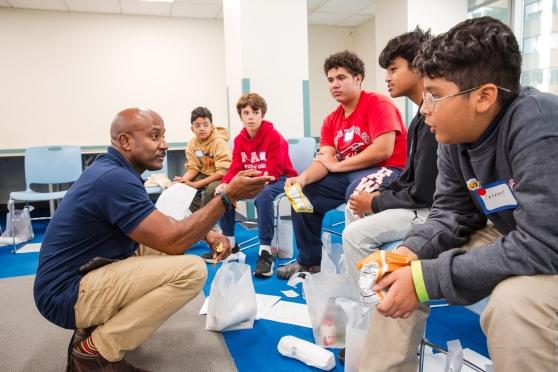UFT Middle School Division’s Anti-Bullying Conference

Tyrone Paulin, a dean at MS 217 in Queens, seeks his students' opinions after they watched a film on bullying.

Students take the “Upstander Pledge,” promising to offer help to peers being bullied.
About 500 middle school students from 31 schools around the city gathered at UFT headquarters on Oct. 24 to learn how to build a culture of inclusivity at their schools with support from BRAVE, the UFT’s program to combat bullying.
“I was really proud,” said Lisa Zabala, a social worker at IS 187 in Brooklyn. Her students were among those who participated in a workshop focused on restorative justice, and they “tapped into their emotional intelligence,” Zabala said. Students watched a silent, student-made film that told a story about bullying, and, in the facilitated discussion that followed, identified the feelings of the characters and shared what they would do if they had a friend facing a similar situation.
UFT Vice President for Middle Schools Richard Mantell, who organizes the UFT Middle School Division’s Anti-Bullying Conference each year in concert with the union’s BRAVE initiative, said such discussions are crucial to addressing bullying.
Bullying, he noted, is particularly prevalent in middle schools. “Half of all middle school students say they’ve experienced bullying at some point, and those are only the students who report it,” he said.
Mantell invited the students to look to each side of them. “Odds are, one of the people sitting next to you has been bullied,” he said. The students took in his message, meeting one another’s eyes, reaching for their friends’ hands or nodding quietly to themselves.
In additional to restorative justice, the workshop topics included an introduction to bullying, de-escalation and cyberbullying.
“We have to keep up with the times,” said Nick Cruz, the UFT director of community and parent engagement, who spearheads the BRAVE initiative. Cruz led the cyberbullying workshop, which provided data to students about the apps and sites on which teens spend the most time and the pitfalls of the platforms. One concern he mentioned was anonymity, which can lead to higher risks of harassment. Cruz guided students through intervention methods like blocking or reporting users for harassment.
Cruz led a discussion about a fictional scenario of bullying in an interactive video game setting. In the scenario, student players stood up for the bullied gamer within the game’s chat function. The students surprised him by how much they identified with the story.
The students told him “that kind of thing really happens to them,” said Cruz. “These kids are living their lives online as much as in the real world, and we need to meet them where they’re at and keep them safe on their phones, at school and at home.”
At the end of the day, students took the BRAVE-led “Upstander Pledge,” promising to proactively offer help to their peers.
Tyrone Paulin, a dean at MS 217 in Queens who attended the conference with a group of his 6th-grade students, appreciated its emphasis on peer intervention.
“There’s stigma about being a ‘snitch,’ when students talk to adults about bullying,” he explained, “but if they have a support group, another student to talk to, they can find ways to report it. Students understand students.”